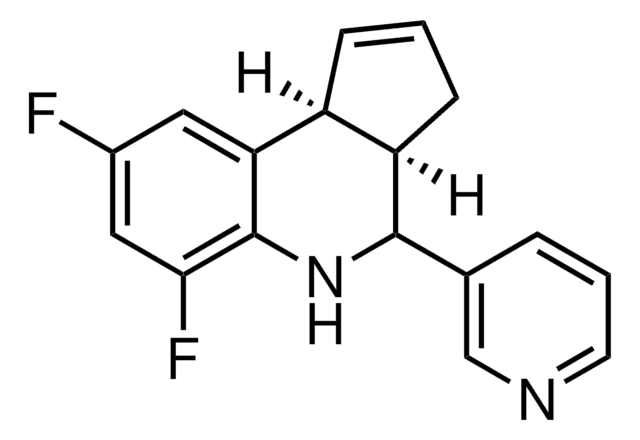B5936
Brefeldin A
from Penicillium brefeldianum, Ready Made Solution, 10 mg/mL in DMSO
Synonym(s):
Synergisidin, γ,4-Dihydroxy-2-(6-hydroxy-1-heptenyl)-4-cyclopentanecrotonic acid λ-lactone, Ascotoxin, BFA, Cyanein, Decumbin
About This Item
Recommended Products
biological source
Penicillium brefeldianum
Quality Level
vapor pressure
0.56 hPa ( 20 °C)
form
solution
autoignition temp.
301 °C
concentration
10 mg/mL in DMSO
solubility
DMSO: 10 mg/mL
antibiotic activity spectrum
neoplastics
Mode of action
cell membrane | interferes
shipped in
wet ice
storage temp.
2-8°C
SMILES string
C[C@H]1CCC\C=C\[C@@H]2C[C@H](O)C[C@H]2[C@H](O)\C=C\C(=O)O1
InChI
1S/C16H24O4/c1-11-5-3-2-4-6-12-9-13(17)10-14(12)15(18)7-8-16(19)20-11/h4,6-8,11-15,17-18H,2-3,5,9-10H2,1H3/b6-4+,8-7+/t11-,12+,13-,14+,15+/m0/s1
InChI key
KQNZDYYTLMIZCT-KQPMLPITSA-N
Looking for similar products? Visit Product Comparison Guide
Related Categories
Application
Biochem/physiol Actions
Other Notes
Storage Class Code
10 - Combustible liquids
WGK
WGK 2
Flash Point(F)
188.6 °F - closed cup
Flash Point(C)
87 °C - closed cup
Personal Protective Equipment
Certificates of Analysis (COA)
Search for Certificates of Analysis (COA) by entering the products Lot/Batch Number. Lot and Batch Numbers can be found on a product’s label following the words ‘Lot’ or ‘Batch’.
Already Own This Product?
Find documentation for the products that you have recently purchased in the Document Library.
Customers Also Viewed
Our team of scientists has experience in all areas of research including Life Science, Material Science, Chemical Synthesis, Chromatography, Analytical and many others.
Contact Technical Service












